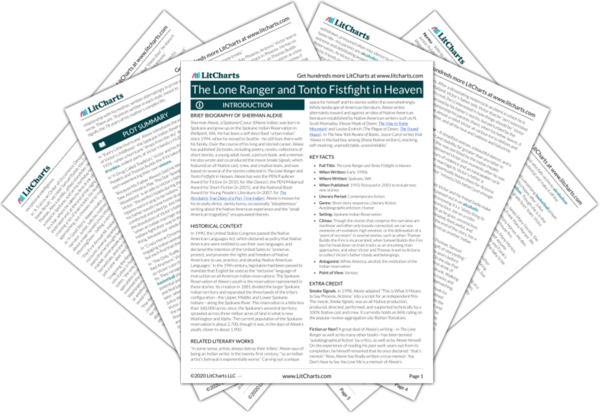Basketball, in these stories, symbolizes hope for the future and the opportunity for change, advancement, and even escape from the reservation. Alexie himself was a gifted basketball player as a child, and he endows his characters with a reverence for the sport born of a kind of magical thinking that elevates success in basketball to represent potential success in life—both for an individual and for the tribe. Victor describes himself as a “former basketball star,” and he and his friend Adrian have high hopes for a rising star named Julius Windmaker, though Julius ultimately falls victim to alcoholism, and his potential is both immediately erased and immediately forgotten—not mourned or lamented. “Our basketball team drives into the river and drowns every year,” Victor jokes in one story; “It’s tradition.” His dark, facetious remark actually reflects the cyclical failure and hopelessness of many promising young basketball stars on the reservation. The swiftness with which the opportunity for escape, either physical or emotional, is taken away from children on the reservation parallels the competitive nature of the sport itself—the dog-eat-dog mentality present in all aspects of reservation life, which Alexie has described as a “locked room on fire” from which the only escape is to stand upon the bones of his ancestors and climb his way out.
Television as a symbol functions throughout the narrative in largely in the same way as basketball; anytime television is mentioned, a character is thinking of, dreaming of, or longing for escape. Television is a limited resource on the reservation—there are certain times of day it functions and certain times it does not—and, as such, it acts as an oft-desired portal between the “locked room” of the reservation and the larger world beyond it. The difference between basketball and television within the narrative is the omnipresence of television. When characters are in their homes, it is almost always left on in the background, with the volume turned low; during the early hours of the morning, characters watch the white noise that replaces programming in the middle of the night. In a description of his childhood, Victor notes that “the television was always too loud, until every emotion was measured by the half hour” and that he would wake “from nightmares to hear the television pounding the ceiling above [his] bed.” Later in his life, when Victor’s existence in Seattle—and his relationship with a white woman—fall into disrepair, he returns home to the reservation and attaches himself to the television, “search[ing] for answers.”
Alexie has referred in interviews to the public’s willingness to ignore the second half of his hyphenated Indian-American identity; through lifting up basketball and television to revered, symbolic status in these stories, Alexie acknowledges the unique place both basketball and television hold in traditional American life, and how their simplicity, comfort, and escapism are desired and valued commodities on the reservation as well.
Basketball and Television Quotes in The Lone Ranger and Tonto Fistfight in Heaven
It’s almost like Indians can easily survive the big stuff. Mass murder, loss of language and land and rights. It’s the small things that hurt the most. The white waitress who wouldn’t take an order, Tonto, the Washington Redskins. And, just like everybody else, Indians need heroes to help them learn how to survive. But what happens when our heroes don’t even know how to pay their bills?
Last night I dreamed about television. I woke up crying.
I picked up a basketball for the first time and made my first shot. No. I missed my first shot, missed the basket completely, and the ball landed in the dirt and sawdust, sat there just like I had sat there only minutes before. But it felt good, that ball in my hands, all those possibilities and angles. It was mathematics, geometry. It was beautiful.
The television was always loud, too loud, until every emotion was measured by the half hour. We hid our faces behind masks that suggested other histories; we touched hands accidentally and our skin sparked like a personal revolution. We stared across the room at each other. We were children; we were open mouths. Open in hunger, in anger, in laughter, in prayer. Jesus, we all want to survive.
Junior hung up the phone and walked down the highway toward the reservation. He wanted to imagine that he was walking off into the sunset, into a happy ending. But he knew that all along the road he traveled, there were reservation drive-ins, each showing a new and painful sequel to the first act of his life.

















